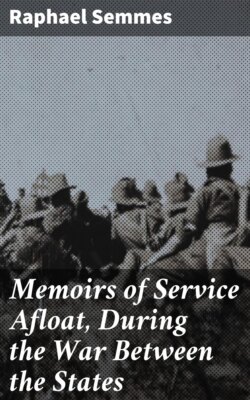Читать книгу Memoirs of Service Afloat, During the War Between the States - Raphael Semmes - Страница 22
На сайте Литреса книга снята с продажи.
CHAPTER XIV.
ОглавлениеTable of Contents
THE SUMTER ON THE WING AGAIN—IS PUT UNDER SAIL FOR THE TIME—REACHES THE ISLAND OF CURAÇOA, AND IS ONLY ABLE TO ENTER AFTER A DIPLOMATIC FIGHT.
From what has been said in the last chapter, the reader will have observed how anxious I was to conform my conduct, in all respects, to the laws of war. My hope was, that some of the nations of the earth, at least, would give me an asylum for my prizes, so that I might have them formally condemned by the Confederate States Prize Courts, instead of being obliged to destroy them. It was with this hope, that I had entered the port of Cienfuegos, as the reader has seen; and it was in furtherance of this object, that I now drew up the following appointment of a Prize Agent, who had come well recommended to me, as a gentleman of integrity and capacity.
C. S. Steamer Sumter, Cienfuegos,
July 6, 1861.
Sir:—You are hereby appointed Prize Agent, for, and in behalf of the Confederate States of America, of the following prizes, to wit: The Cuba, Machias, Ben. Dunning, Albert Adams, Naiad, West Wind, and Louisa Kilham, and their cargoes, until the same can be adjudicated, by the Prize Courts of the Confederate States, and disposed of by the proper authorities. You will take the necessary steps for the safe custody of these prizes, and you will not permit anything to be removed from, or disturbed on board of them. You will be pleased, also, to take the examinations of the master, and mate of each of these vessels, before a notary, touching the property of the vessels, and cargoes; and making a copy thereof, to be retained in your own possession, you will send, by some safe conveyance, the originals, addressed to “The Judge of the Confederate States District Court, New Orleans, La.”
I have the honor to be, &c.,
Raphael Semmes.
Señor Don Mariano Dias.
During the day, the steam-tug towed down from the town, for me, a couple of lighters, containing about one hundred tons of coal, five thousand gallons of water, and some fresh provisions for the crew. It was necessary that we should prepare for sea, with some dispatch, as there was a line of telegraph, from Cienfuegos to Havana, where there were always a number of the enemy’s ships of war stationed. As a matter of course, the U. S. Consul at Cienfuegos had telegraphed to his brother Consul, in Havana, the arrival of the Sumter, in the first ten minutes after she had let go her anchor; and as another matter of course, there must already be several fast steamers on their way, to capture this piratical craft, which had thus so unceremoniously broken in upon the quiet of the Cuban waters, and the Yankee sugar, and rum trade. I had recourse to the chart, and having ascertained at what hour these steamers would be enabled to arrive, I fixed my own departure, a few hours ahead, so as to give them the satisfaction of finding that the bird, which they were in pursuit of, had flown. My excellent first lieutenant came up to time, and the ship was reported ready for sea before sunset, or in a little more than twenty-four hours, after our arrival.
To avoid the coal dust, which is one of the pests of a steamer, and the confusion, and noise which necessarily accompany the exceedingly poetic operation of coaling, I landed, as the sun was approaching the western horizon, in company with my junior lieutenant and sailing-master, for a stroll, and to obtain sights for testing my chronometers, as well. Having disposed of the business part of the operation first, in obedience to the old maxim; that is to say, having made our observations upon the sun, for time, we wandered about, for an hour, and more, amid the rich tropical vegetation of this queen of islands, now passing under the flowering acacia, and now under the deep-foliaged orange-tree, which charmed two senses at once—that of smell, by the fragrance of its young flowers, and that of sight, by the golden hue of its luscious and tempting fruit. We had landed abreast of our ship, and a few steps sufficed to put us in the midst of a dense wilderness, of floral beauty, with nothing to commune with but nature. What a contrast there was between this peaceful, and lovely scene, and the life we had led for the last week! We almost loathed to go back to the dingy walls, and close quarters of our little craft, where everything told us of war, and admonished us that a life of toil, vexation, and danger lay before us, and that we must bid a long farewell to rural scenes, and rural pleasures. As we still wandered, absorbed in such speculations as these, unconscious of the flight of time, the sound of the evening gun came booming on the ear, to recall us to our senses, and retracing our steps, we hurriedly re-embarked. That evening’s stroll lingered long in my memory, and was often recalled, amid the whistling, and surging of the gale, and the tumbling, and discomforts of the ship.
I had been looking anxiously, for the last few hours, for the arrival of our prize brigantine, the Cuba, but she failed to make her appearance, and I was forced to abandon the hope of getting back my prize crew from her. I left with my prize agent, the following letter of instructions for the midshipman in command of the Cuba.
